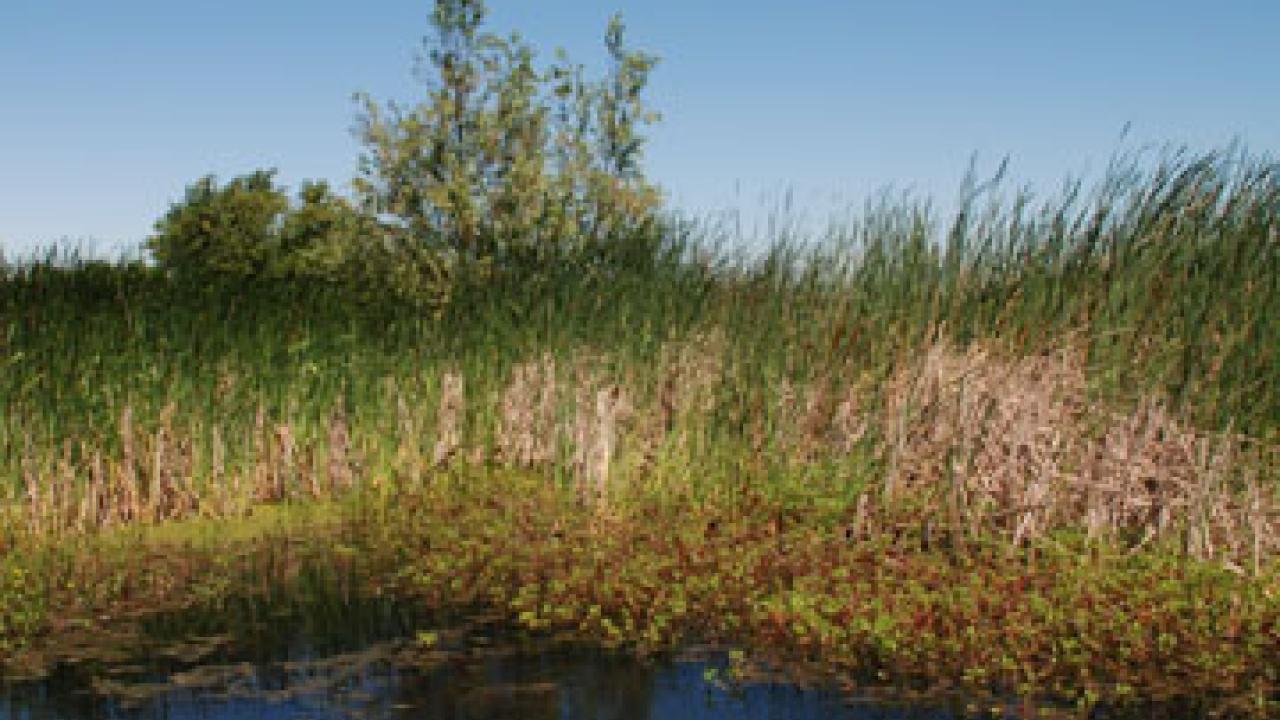UC Davis is joining federal and state agencies in the Sacramento-San Joaquin River Delta for expanded research into "carbon-capture" farming -- a process of trapping carbon dioxide and rebuilding the soil base.
"UC Davis scientists will play a major role in this project," said William Horwath, a professor in the Department of Land, Air and Water Resources, and holder of the James G. Boswell Endowed Chair in Soil Sciences.
"We'll be providing the scientific expertise necessary to gain a better understanding of the factors controlling carbon capture in these re-established wetlands."
UC Davis' participation is made possible by a three-year, $12.3 million grant from the state Department of Water Resources. UC Davis and the U.S. Geological Survey are sharing the grant, which was announced July 23.
Carbon-capture farming aims to keep carbon dioxide and other greenhouse gases out of the atmosphere, while at the same time easing pressure on the delta's aging levee system. Success on those two fronts will bring new economic potentialto the delta, officials say.
The Geological Survey already is a partner with the water resources department on a pilot project that has showed carbon-capture farming's promise in the delta. The process is designed to reverse the effects of long-standing farming practices on the fragile and unique peat soil that forms delta islands.
The islands are subsiding due to cultivation and the soil's exposure to wind and rain. Most of the delta's farmed islands are more than 20 feet below the surrounding water -- threatening the stability of the levees.
The levees keep water off the delta islands, of course, but they also channel freshwater to more than 25 million Californians and millions of acres of Central Valley farmland.
There is more to worry about, though. As the delta islands erode, there is less earth to hold in greenhouse gases.
To raise the islands, thereby containing those gases and protecting the levees, researchers set about "growing" wetlands on the deeply subsided Twitchell Island, in the western delta.
USGS scientists recorded elevation gains of more than 10 inches from 1997 to 2005 on two seven-acre test plots as cattails, tules and other plants grew, died and decomposed. The process leaves behind roots and plant remnants that compact into a material similar to what initially formed the peat soil.
With the $12.3 million grant, the USGS and Department of Water Resources plan to take carbon-capture farming from pilot project to full scale in a scientifically and environmentally sound way.
The research project calls for the construction of new wetlands on up to 400 acres on a western delta island, starting in the spring of 2009.
"This project is an investment in California's future that could reap multiple benefits over several decades -- for California, the nation and the world," said Roger Fujii, the project director and San Francisco Bay and delta program chief for the USGS California Water Science Center.
"It will build on the results of the ongoing Twitchell Island Pilot Project and assess on a large scale the ability of re-established wetlands on delta peat islands to sequester carbon, reverse subsidence and provide an economically sustainable land-use practice."
Researchers intend to develop wetland management approaches that maximize carbon sequestration and subsidence reversal, and evaluate and seek to minimize other potential environmental consequences, such as how to effectively manage any changes in mosquito populations.
David Mraz, chief of the Delta Suisun Marsh Office for the state Department of Water Resources, said the developing carbon market "holds great promise for regaining land elevation in the delta," via carbon-capture farming.
The carbon market refers to the trading of emission credits. Such a market is required in California by 2011, under a state law mandating a reduction in greenhouse gas emissions.
Some industrial plants may decide that implementing such reductions would be prohibitively expensive or impractical, and may look to offset their emissions by paying someone else to cut back or sequester carbon dioxide in the ground.
Payments going to delta farmers could be an economic incentive to sustain the existing levee system, Mraz said.
On the Net
For a briefing paper, video, maps and photos, click here.
Media Resources
Dave Jones, Dateline, 530-752-6556, dljones@ucdavis.edu
